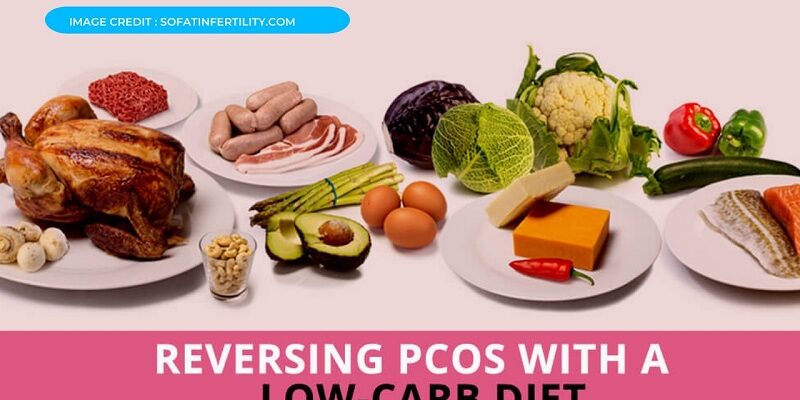Polycystic Ovarian Syndrome (PCOS) is a syndrome in which there is dysfunction of the hormone system and results in an imbalance of androgens and estrogen, leading to symptoms such as infertility, excess hair growth, acne, thinning hair, and weight gain. This article will discuss some of the dietary considerations for PCOS patients managing their symptoms with diet.
What is PCOS?
Polycystic ovary syndrome or PCOS is a hormonal disorder that affects reproductive health. It is the most common cause of female infertility. The condition is characterized by enlarged ovaries filled with small collections of fluid called follicles, which can develop into cysts.
The insulin resistance in PCOS also increases the risk for Type 2 Diabetes and other endocrine disorders. Women with PCOS are more likely to struggle with obesity, depression, anxiety, and high cholesterol levels because each condition can worsen the others.
Main causes of PCOS
PCOS is a condition that affects an estimated 5-10% of all women. Women who have PCOS produce too much androgen, which can lead to problems such as acne and increased hair growth. The most common treatment for the condition is the administration of birth control pills that inhibit ovulation.
There can be other causes of PCOS you can consult with Dr. Hrishikesh Pai one of the leading ivf doctor in Mumbai if you are facing difficulties regarding PCOS.
What are the symptoms of PCOS?
Polycystic ovary syndrome (PCOS) is a condition women get when their ovaries make too many androgens, which is a hormone that increases male features like facial hair. PCOS can cause: acne, thinner hair on the scalp, and patches of skin that don’t have hair on them. If you are facing this symptoms you can visit to Dr. Hrishikesh Pai one of the famous ivf doctors in India with years of expertise.
What is a low-carb diet and how does it help with PCOS?
PCOS is a hormonal disorder. The goal of the diet is to stabilize insulin levels and reduce weight. This is done by restricting the number of carbs eaten during the day so that blood sugar is not spiked. Low carb diets are popular because they are effective for both weight loss and PCOS.
According to studies, what people eat has a big impact on PCOS. However, there is currently no typical PCOS diet.
There is, however, widespread agreement on which meals are helpful and appear to assist patients to manage their disease, as well as which foods to avoid.
Diet for PCOS
PCOS is a condition that affects the female reproductive system. The most common symptoms of PCOS include irregular periods, excess hair growth on the face and body, acne, and weight gain.
A diet for PCOS is necessary because it can help to relieve some of these symptoms. It’s recommended to eat a low-carbohydrate diet with high levels of protein and unsaturated fats. This will help to regulate insulin and blood sugar levels which in turn will reduce inflammation.
The following are three diets that may assist patients with PCOS in managing their symptoms:
- A low glycemic index (GI) diet: Meals with a low GI are digested more slowly by the body, which means they do not cause insulin levels to rise as much or as quickly as foods with a higher GI, such as carbs. Whole grains, legumes, nuts, seeds, fruits, starchy vegetables, and other unprocessed, low-carbohydrate foods are all included in a low GI diet.
- Anti-inflammatory diet: Anti-inflammatory foods including berries, fatty salmon, leafy greens, and extra virgin olive oil can help to alleviate inflammation-related symptoms like weariness.
- DASH diet: The DASH (Dietary Approaches to Stop Hypertension) diet is frequently recommended by doctors to lower the risk or impact of heart disease. It may also aid in the treatment of PCOS symptoms. Fish, poultry, fruits, vegetables, whole grains, and low-fat dairy products are abundant in a DASH diet. Foods high in saturated fat and sugar are forbidden from the diet.
Foods to avoid on a low-carb diet.
If you have PCOS, a low-carb diet can be a great way to control your symptoms. Many women with the disorder find that eliminating carbs from their diets improves their hormonal production as well as their moods.
When it comes to following a low-carb diet, there are certain foods that you should avoid. Certain types of fruit and starchy vegetables should be avoided because they will raise your insulin levels and make you feel more hungry.
- Carbohydrates that have been refined, such as mass-produced pastries and white bread.
- Fried foods, such as fast food, are one example.
- Carbonated beverages, such as sodas and energy drinks, are high in sugar.
- Hot dogs, sausages, and luncheon meats are examples of processed meats.
- Margarine, shortening, and lard is examples of solid fats.
- Steaks, hamburgers, and pork are examples of excess red meat.
Conclusion
Diets have a huge impact on PCOS and even Self-care habits such as getting enough sleep, avoiding over-commitment, and scheduling time to relax can also aid in the management of PCOS. Consult with Dr Hrishikesh Pai today if you are having difficulties with PCOS and get it treated at most advanced and affordable price.

